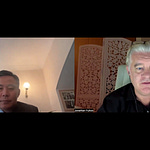Last week’s conversations provided useful perspectives on the opportunities, challenges, and limitations of the China-Iran bilateral relationship. I wanted to look from a different vantage point: what’s the view from the US, particularly from the policy community. Fortunately, my friend Jonathan Panikoff at the Atlantic Council just recently released a comprehensive report, “A bipartisan Iran strategy for the next US administration—and the next two decades,” a project that Jonathan has led over the last two years. It is a massively ambitious report, meant to offer an incoming US administration a ready-baked Iran strategy on day one, and involved a serious list of contributors and an impressive advisory committee and working group. I encourage you to download it, read it and share it.
One of the diagnosis that’s relevant to the work I do here at the Newsletter involves the PRC:
Iran is a deeply ideological regime unlikely to change its fundamental outlook on the world. But the geostrategic context has changed over the last two decades: Iran’s foreign ties are now so bolstered and buoyed, particularly by China, that isolating Tehran is far more difficult than ever before. These circumstances demand a bipartisan, long-term strategy that can span administrations.
China gets a dedicated section in the report that many of you will find interesting. A paragraph that jumped out at me:
Washington should focus its efforts on competing against, instead of trying to find common ground with, Beijing on addressing the threats presented by Tehran. This includes not only working with allies but also developing ties and partnerships with other countries, including in the Global South, on addressing threats emanating from Iran. For example, Riyadh and Washington share similar concerns about Iran. The US government likely would be better served approaching Riyadh rather than Beijing to try reining in Iran, based on Saudi and Iranian mutual interest in preserving the détente they reached in March 2023. Similarly, Saudi Arabia may be better positioned to ask China to intervene with Iran. Not only are Sino-Saudi economic ties more developed than those between China and Iran— Riyadh was China’s main supplier of oil until Russia replaced it in April 2023—but Beijing also sees Riyadh as a key regional player and, therefore, a focal point of China’s Middle East policy.
Read the whole report, but in the meantime, enjoy the conversation.
I should point out, I’m tryting to get a Chinese Iran specialist to join soon to provide a Chinese perspective as well; it’s not as easy a process as you might imagine, but hopefully I’ll have some good news on that front soon.









